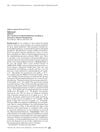 November 2022 in “Journal of the Endocrine Society”
November 2022 in “Journal of the Endocrine Society” Long-term treatment with buprenorphine/naloxone for opioid addiction may lead to secondary adrenal insufficiency.
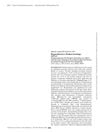 November 2022 in “Journal of the Endocrine Society”
November 2022 in “Journal of the Endocrine Society” A woman's masculine symptoms were caused by a rare tumor in her left ovary, which was found using a special blood test.
 November 2022 in “Journal of the Endocrine Society”
November 2022 in “Journal of the Endocrine Society” Always consider xanthomatous hypophysitis before deciding on pituitary surgery.
[object Object] 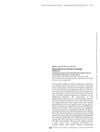 November 2022 in “Journal of the Endocrine Society”
November 2022 in “Journal of the Endocrine Society” Removing the ovarian tumor improved the woman's hormonal symptoms.
 June 2022 in “Evidence-based complementary and alternative medicine”
June 2022 in “Evidence-based complementary and alternative medicine” Acupressure improves quality of life in PCOS patients.
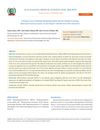 October 2021 in “Acta Scientific Medical Sciences”
October 2021 in “Acta Scientific Medical Sciences” A woman was diagnosed with a rare adrenal gland cancer that did not show usual hormone-related symptoms.

 January 2019 in “Current research in diabetes & obesity journal”
January 2019 in “Current research in diabetes & obesity journal” A woman with type 2 diabetes developed alopecia areata, suggesting a link between the two autoimmune conditions.

Early NAS level changes affect alcohol consumption vulnerability.
 January 2017 in “IMC Journal of Medical Science”
January 2017 in “IMC Journal of Medical Science” A rare endocrine disorder, APS 1, was diagnosed in a 26-year-old man in Bangladesh.
 December 2016 in “Springer eBooks”
December 2016 in “Springer eBooks” Chrousos Syndrome is caused by mutations that make the body less sensitive to glucocorticoids, leading to various symptoms and requiring high-dose treatment.
[object Object]  July 2015 in “Cambridge University Press eBooks”
July 2015 in “Cambridge University Press eBooks” Androgens like testosterone affect skin health and can lead to conditions such as acne and hair loss, with various treatments available.
 January 2014 in “European Geriatric Medicine”
January 2014 in “European Geriatric Medicine” A postmenopausal woman's virilization was caused by a rare ovarian tumor that was hard to detect but was successfully treated with surgery.
 January 2013 in “Revista Clínica Española”
January 2013 in “Revista Clínica Española” A postmenopausal woman's increased male hormone levels were successfully treated with surgery.
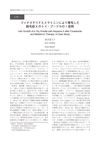 January 2013 in “Juui rinshou hifuka”
January 2013 in “Juui rinshou hifuka” A Toy Poodle with hair loss regrew hair after being treated with melatonin and finasteride.
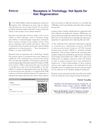 January 2013 in “International journal of trichology”
January 2013 in “International journal of trichology” Vitamin D3 and its receptor are important for hair growth, and understanding receptors could help treat hair graying and skin cancer.
 January 2012 in “Yearbook of Dermatology and Dermatologic Surgery”
January 2012 in “Yearbook of Dermatology and Dermatologic Surgery” Studying acne-related syndromes helps us understand acne causes and can lead to new treatments.
 December 2011 in “InTech eBooks”
December 2011 in “InTech eBooks” Systemic corticosteroids can help treat rapidly spreading vitiligo but require more research for safer use.
 November 2009 in “Companion Animal”
November 2009 in “Companion Animal” The document suggests that Alopecia X in dogs is mainly a cosmetic issue and might be better left untreated.

A young woman with kidney failure had hair loss due to a common hormonal disorder, which improved with hormone therapy.
 October 2007 in “Postgraduate obstetrics & gynecology”
October 2007 in “Postgraduate obstetrics & gynecology” Testosterone therapy can help postmenopausal women with low sexual desire but needs more safety research and should be used with estrogen therapy.
 October 2007 in “Postgraduate obstetrics & gynecology”
October 2007 in “Postgraduate obstetrics & gynecology” Testosterone therapy can help with androgen deficiency in women but should be used with caution and monitoring due to potential risks.
 May 2006 in “Women's Health Medicine”
May 2006 in “Women's Health Medicine” Excessive hair growth in women, often from high androgen levels, is usually caused by PCOS, and can be treated with hair removal, medication, and possibly weight loss.
 October 2004 in “European Neuropsychopharmacology”
October 2004 in “European Neuropsychopharmacology” Impulsiveness is common across various psychiatric disorders and linked to many psychological symptoms.
 January 1986 in “Journal of Steroid Biochemistry”
January 1986 in “Journal of Steroid Biochemistry” Women with severe acne, hirsutism, and androgenic alopecia often have higher levels of certain androgens, but the specific pattern can't be predicted just by looking at symptoms.
 January 1986 in “Journal of Steroid Biochemistry”
January 1986 in “Journal of Steroid Biochemistry” Lower testosterone levels in men may be linked to a higher risk of severe coronary artery disease.

Oral contraceptives may cause significant hair loss in women.
 1540 citations,
October 2008 in “Fertility and Sterility”
1540 citations,
October 2008 in “Fertility and Sterility” The report concludes that PCOS is mainly a condition of excess male hormones and its definition may change as new information is discovered.
 1514 citations,
December 2011 in “Fertility and sterility”
1514 citations,
December 2011 in “Fertility and sterility” Experts agree that PCOS affects women's health in complex ways, but more research is needed to understand and treat it effectively.
 991 citations,
January 2011 in “Nature Reviews Endocrinology”
991 citations,
January 2011 in “Nature Reviews Endocrinology” The document concludes that PCOS is a complex disorder caused by both genetic and environmental factors, affecting women's health in various ways, and requires personalized treatment.






























